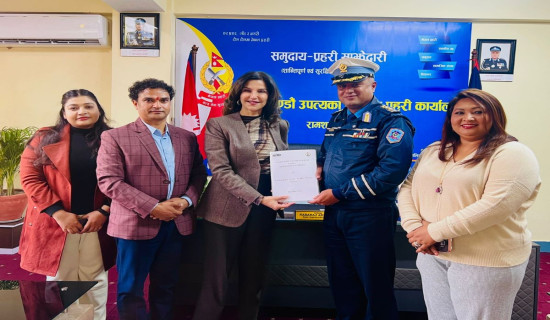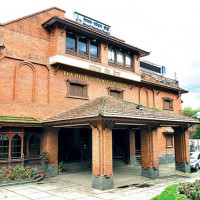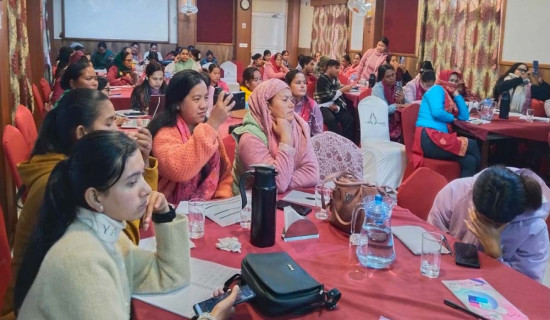- Thursday, 25 December 2025
Trishuli 3B Hub, Valche substation inaugurated
By A Staff Reporter,Kathmandu, May 18:The Trishuli 3B Hub 220/132/33 kV substation constructed at Paherebensi in Kispang Rural Municipality of Nuwakot, under the Chilime-Trishuli 220 kV transmission system project has been inaugurated.
As part of the project's corporate social responsibility, the 33/11 kV electricity distribution substation constructed in Valche of Kispang Rural Municipality through the community electrification programme has also been inaugurated.
Minister for Energy Water Resources and Irrigation Shakti Bahadur Basnet and Deputy Director General at the European Commission Directorate General for International Partnerships Myriam Ferran, Ambassador of the European Union to Nepal Veronique Lorenzo, German Ambassador to Nepal Thomas Prinz and Director of the European Investment Bank (EIB) Thouraya Triki jointly inaugurated the Trishuli 3B Hub and Valche substation on Friday.
According to a press statement issued by the Nepal Electricity Authority, the cost of Trishuli 3B Hub substation, built in about 104 ropanis of land, is Rs. 1.97 billion.
Trishuli-Kathmandu 220 kV transmission line is connected to Trishuli 3B Hub substation with Matatirtha substation.
The cost of the neighbourhood electrification programme including Valche substation and Trishuli 3B Hub-Valche 33 kV transmission line is Rs. 429.3 million.
The 33 and 11 kV lines and distribution substations have been constructed through the Community Electrification Programme to expand electricity access and supply to the areas affected by transmission lines and substations in Nuwakot and Rasuwa districts and to make supply reliable and qualitative.
More than 2,000 households in Nuwakot and Rasuwa have benefited from this, said the NEA.
Inaugurating the substation, Minister Basnet said that an important step was taken by the construction of the substation not only for the electricity produced by the hydroelectric projects in the Trishuli River catchment area but also for the management of the country's electricity system as a whole.
To meet the target of 28,000 megawatts of electricity production within the next 12 years, policy, legal and structural reforms have been started to make the generation, transmission and distribution sectors investment-friendly. Minister Basnet said.
Minister Basnet said that the projects progressed by making the residents affected by the hydropower project its shareholders.
He said that the government, local community, foreign and private sector investments in the hydropower sector will be promoted in a coordinated manner.
Deputy Director General at the European Commission Directorate General for International Partnerships Myriam Ferran said that substations are important for increasing the production of renewable green energy to deal with the problems caused by climate change.
Ferran said that it is a matter of pride for the EU as Nepal will benefit from the construction of the substation.
German Ambassador to Nepal Thomas Prinz said that around 70 million euros are being given as a subsidy to supply the clean green energy produced to consumers' homes.
Managing Director of NEA Kul Man Ghising urged the European Union and its member states to invest in the infrastructure of this sector for the sustainable development of Nepal's green energy.
He asked for investments as about USD 46 billion is needed in the production, transmission and distribution infrastructure to meet the target of 28,500 megawatts of electricity production in the next 12 years.
Thark Bahadur Thapa, director of the project, said that the substation will make a significant contribution to making Nepal's overall electricity system reliable and qualitative.
He said that the Chilime Hub-Trishuli 3B Hub transmission line will be completed within one month.
Under the Chilime-Trishuli 220 kV transmission system project, the construction of 28 km 220 kV double circuit transmission line from Chilime Hub 220 kV substation to Trishuli 3B Hub and Chilime Hub 220 KV substation at Thambuchet in Aamachhodingmo Rural Municipality of Rasuwa is in the final stage.
The Chilime-Trishuli 220 kV transmission system project with an estimated cost of Rs. 6.19 billion is an investment by the government of Nepal and the NEA and is supported by grants from the German Development Bank and the EU.
The EIB established by the EU has provided concessional loans for the project.
The Chilime-Trishuli 220 kV transmission line and Chilime and Trishuli 3B hub substations have been constructed to transmit the electricity of the hydroelectric projects under construction and to be built in the Trishuli River and its tributaries to the national system.
About 1,200 megawatts of electricity can flow from transmission lines and substations.
















